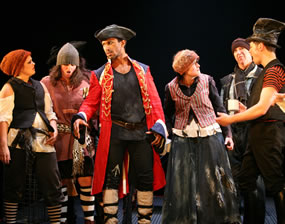
The Convict’s Opera
I attended this production late in its season. I had read and been told a lot of things about this production. None of them encouraging. And it did prove to be a very dispiriting night in the theatre.
It had nothing to do with the performances .
In fact, I should like to begin by congratulating the Actors of this company for a great show of professionalism. Valiantly giving committed and cheerful performances in what could only be a disheartening project. The theatre auditorium, fairly empty and those of us there, generally responding supportedly, but in a bewildered manner. Peter Cousens, in fact gave a really remarkable performance, both his Lockit and Eddie Cosgrove are detailed and lively and when he has a great speech to give, he transported us into a pulsing, poetic, imaginative world. Under any circumstance this was outstanding work. Similarly, I should like to compliment Glenn Butcher and Catherine Russell and Karina Fernandez. The energy and focus and efforts to engage us were object lessons of the actors’ craft and inspiration at work. Actors that sing very well, act convincingly, move beautifully, some, playing instruments to create an orchestra live on stage. Much to admire. I feel as if I sound a little as if I am scrambling for something positive to say. In truth I am not. I thought the work of the Acting company (and no doubt the back stage crew, in support as well) was worth talking about.
The problem seems to be the origins of the idea for the play. The play is about the journey of a convict transport ship on its journey from England to the colony in Australia. We travel with this ship to the different ports of call and experience the exigencies of such a voyage, such as being becalmed in the doldrums of nature, celebrations on crossing the equator, storms, threatened mutiny and the liaisons of crew and convicts etc. The conceit at the centre of the play is that while making this journey the Captain of the ship has had the idea that the convicts should rehearse a production of THE BEGGAR’S OPERA to be presented at the voyage end. So the play is cast, the rehearsals begin, the voyage is undertaken. It all unravels. Inevitably the lives of the convicts and the characters of the material become entwined etc. Some of the convicts have their lives elevated and enhanced by being involved in the creation of art. And finally humanity triumphs and in this production we all take inspiration from the wide azure blue of the great sky space of Australia.(ie the big blue sky cloth at the STC lit beautifully by Nick Schlieper.)
Now, if this sounds familiar, it may be because the play OUR COUNTRY’S GOOD by Timberlake Wertenbaker (based on the novel, The Playmaker by Thomas Keneally) has very similar intentions. And in fact this was directed by Max Stafford–Clark for the Royal Court and “transported” memorably to the STC for a season, nearly 20 years ago. It was, as Mr Stafford-Clark reminds us in his program notes, a memorable experience. (Mr Stafford-Clark also mentions Robert Hughes’ THE FATAL SHORE as an inspiration. I hope he read the more recent COMMONWEALTH OF THIEVES by Thomas Keneally too. It seems to me a more cogent contemporary development on the story of our history.
On paper, the combination of THE BEGGAR’S OPERA, a writer of the skill of Stephen Jefferys (THE LIBERTINE, THE CLINK and last year’s interesting THE ART OF WAR) and the famous and prodigious reputation of Max Stafford-Clark looks a promising investment. However something has gone wrong. The mixing of the John Gay world and the world of Stephen Jeffreys never seem to match in quality. The Gay wins hands down for veracity and insight. The Jeffreys often sounds pompous and just a little condescending in its social message, too didactic, too transparent in its intentions. The writing only occasionally flashes the brilliance of his usual density of thought, character and language (THE LIBERTINE). The mixing of the original Ballad Opera score with contemporary popular culture tunes such as SAILING, I WANT TO BE STRAIGHT, THOSE WERE THE DAYS etc, whilst initially amusing, in the end seem an increasingly desperate measure to keep the work alive by giving the audience a culture fix they can recognise. The techniques employed by the director to tell the story feel very familiar, even, in this manifestation contrived, and lack the creative energy to keep it disguised.
The space, the Sydney Theatre, just feels to big for this project. The Set (Dale Ferguson) whilst it is practical appears to be overblown (the scale of the space is the problem!!!????). Costumes (Tess Schofield) are witty but they too run out of means to keep us from being bored with them. (We become obsessed with the make of jeans.) The lighting, as usual, from Mr Schlieper is impressive.
It is a moribund night in the theatre.
The fact that this production is travelling to London, especially after the critical debacle over RIFLEMIND, does not augur well for the Company’s artistic reputation internationally. Oh well. We cast the die and these are the consequences. No one sets out to make bad work. What will be, will be.
Playing now until 25 October. Book online or call 02 9250 177.